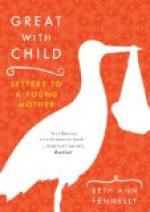But these families and communities are most healthy and happy, not because they live in a proper manner, by fits and starts, but because they have, from some cause or other, adopted and persevered in HABITS which, compared with the habits of other families, or other communities, are preferable; that is, more in obedience to the laws which govern the human constitution. Not that even they are “without sin” or error on this subject—gross error too—but because their errors are fewer or less destructive than those of their neighbors.
Now is it possible that any intelligent father or mother of a family, whose diet, clothing, exercise, &c. are thus comparatively well regulated, would derive no benefit from the perusal of works which treat candidly, rationally, and dispassionately, on these points? Is there a mother in the community who is so destitute of reason and common sense as not to desire the light of a broader experience in regard to the tendency of things than she has had, or possibly can have, in her own family? Is there one who will not be aided by understanding not only that a certain thing or course is better than another, but also WHY it is so?
It is by no means the object of this little work to set people to watching their stomachs from meal to meal, in regard to the effects of food, drink, &c.; for nothing in the world is better calculated to make dyspeptics than this. It is true, indeed, that some things may be obviously and greatly injurious, taken only once; and when they are so, they should be avoided. But in general, it is the effect of a habitual use of certain things for a long time together—and the longer the experiment the better—which we are to observe.
A book to guide mothers in the formation of early good habits in their offspring, should be the result of long observation and much experiment on these points, but more especially of a thorough understanding of human physiology. It should not consist so much of the conceits of a single brain—perhaps half turned—as of the logical deductions of severe science, and facts gleaned from the world’s history.
Here is a nation, or tribe of men, bringing up children to certain habits, from generation to generation—and such and such is their character. Here, again, is another large portion of our race, who, under similar circumstances of climate, &c. &c., have, for several hundred years, educated their children very differently, and with different results. A comparison of things on a large scale, together with a close attention to the constitution and relations of the human system, affords ground for drawing conclusions which are or may be useful. If this book shall not afford light derived from such sources, it were far better that it had never been written. If it only sets people to watching over the effects of things taken or used only for a single day, instead of leading them from early infancy to form in their children such




